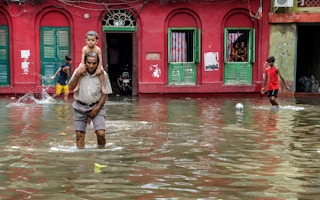The quick succession of hurricanes Harvey, Irma and Jose hitting the Caribbean islands, Texas and Florida as well as one-in-100-year floods in South Asia hitting first Nepal, then India and now Bangladesh now has brought into clear focus the issue of how serious a threat we face from climatic impacts directly attributable to human induced climate change due to higher-than-normal atmospheric and ocean temperatures.
This is highly relevant for the forthcoming 23rd Conference of Parties (COP23) of the United Nations Framework Convention on Climate Change (UNFCCC) taking place in Bonn in a few weeks, under the presidency of Fiji on behalf of the Pacific island states .
The Prime Minister of Fiji has already indicated that he wants COP23 to take forward the already agreed issue of tackling growing loss and damage from climate change .
There are two agenda items under which this topic will be discussed. The first is the already established Warsaw International Mechanism on Loss and Damage that was set up with an executive committee and workplan four years ago at COP19.
This should now discuss the issue of raising additional funds to pay for loss and damage due to climate change.
The second item is under Article 8 (on Loss and Damage) of the Paris Agreement, under which the main issue is how to deal with potential displacement and migration of people who lose their livelihoods due to climate change.
Additional funds are needed to deal with both of the problems, and to plan to help future climate migrants move safely. Both issues have become much more urgent this year, as climate disasters surge, and should be a major focus of discussion in Bonn in November.
One of the politically sensitive aspects of this is the taboo imposed by the developed countries on using terms such as liability and compensation. The politically acceptable euphemism is paying for loss and damage.
“
COP23 is the place to accept this and move on, to come up with practical solutions to compensate those most adversely impacted by human induced climate change.
However, I feel that now is the time to break this taboo and accept that we need to openly discuss issues related to assigning liability for climate threats as well as providing compensation to those most badly affected.
When it comes to assigning liability – namely saying who is responsible for how much of the emissions that cause climate change – the calculations are relatively easy and can apply to countries and to companies.
However when it comes to compensation the situation becomes more sensitive and political. Nonetheless, the polluter-pays principle suggests countries and even some fossil fuel companies should carry the burden.
As worsening weather disasters bring ever-growing losses, the time for equivocation around the issue of loss and damage, or more correctly, liability and compensation, is over. COP23 is the place to accept this and move on, to come up with practical solutions to compensate those most adversely impacted by human induced climate change.
Saleemul Huq is director of the International Centre for Climate Change and Development at the Independent University in Bangladesh. This article is republished from Thomson Reuters Foundation.











